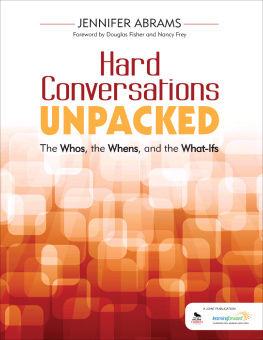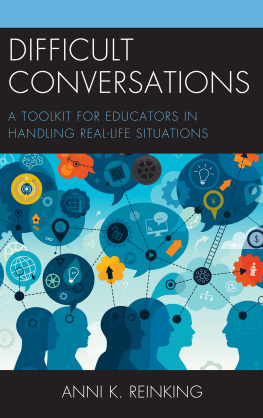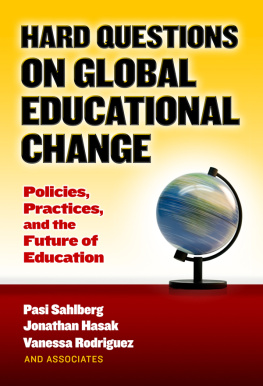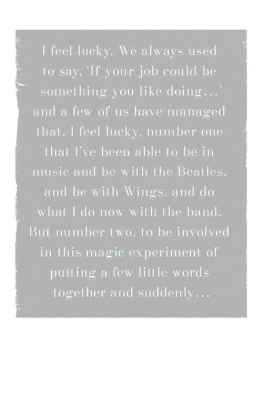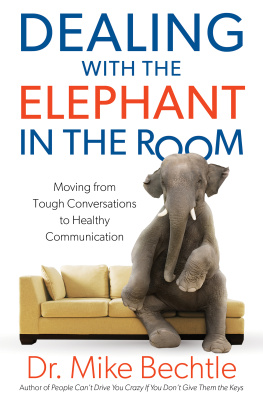Having
Hard
Conversations
Having
Hard
Conversations
Jennifer Abrams
Foreword by Arthur L. Costa

Copyright 2009 by Corwin
All rights reserved. When forms and sample documents are included, their use is authorized only by educators, local school sites, and/or noncommercial or nonprofit entities that have purchased the book. Except for that usage, no part of this book may be reproduced or utilized in any form or by any means, electronic or mechanical, including photocopying, recording, or by any information storage and retrieval system, without permission in writing from the publisher.
For information:
 | Corwin
A SAGE Company
2455 Teller Road
Thousand Oaks, California 91320
(800) 233-9936
Fax: (800) 417-2466
www.corwinpress.com | SAGE India Pvt. Ltd.
B 1/I 1 Mohan Cooperative Industrial Area
Mathura Road, New Delhi 110 044
India |
SAGE Ltd.
1 Olivers Yard
55 City Road
London, EC1Y 1SP
United Kingdom | SAGE Asia-Pacific Pte. Ltd.
33 Pekin Street #02-01
Far East Square
Singapore 048763 |
Printed in the United States of America.
Library of Congress Cataloging-in-Publication Data
Abrams, Jennifer.
Having hard conversations/Jennifer Abrams.
p. cm.
Includes bibliographical references and index.
ISBN 978-1-4129-6499-9 (cloth)
ISBN 978-1-4129-6500-2 (pbk.)
1. Communication in educationUnited States. 2. Interpersonal communicationUnited States. 3. TeachersProfessional relationshipsUnited States. 4. Educational leadershipUnited States. I. Title.
| LB1033.5.A27 2009 |
| 371.1022dc22 | 008038185 |
This book is printed on acid-free paper.
09 10 11 12 13 10 9 8 7 6 5 4 3 2 1
| Acquisitions Editor: | Dan Alpert |
| Associate Editor: | Megan Bedell |
| Production Editor: | Eric Garner |
| Copy Editor: | Claire Larson |
| Typesetter: | C&M Digitals (P) Ltd. |
| Proofreader: | Charlotte Waisner |
| Indexer: | Terri Corry |
| Cover Designer: | Lisa Riley |
Contents
Foreword
Arthur L. Costa
Foreword
A s a child, I can remember my mother telling me, If you cant say something nice, dont say anything at all. When my older brother teased me, when other kids crowded in line in front of me, when my teachers disciplined me without warrant, I learned to turn the other cheek, to hold my feelings inside, and to say nothing. I actually felt I was gaining an inner strength to withhold my thoughts, my emotions, and my words.
In my early professional life, these behavioral patterns sustained me. Educators are noted for avoiding conflict, for not rocking the boat or ruffling feathers, for holding personal relationships above organizational goals, and for striving to be perceived as nice guys. While I might be bristling inside because of detecting an inequity in practice or finding an inconsistency between what was being advocated and my personal value system, if I couldnt say something nice, Id say nothing at all.
Over the years, however, I began to develop a clearer set of values. Through writing, coaching, and consulting, I realized the power of words, that I had something to say and that others would often listen. Do I think, therefore, that Im now an effective communicator? No, but Im continually learning, and Im trying to improve. I wish I had had this book much earlier in my career. If I had only had known then ! What I learned through the hard knocks experienced from my well-intentioned but inept, stumbling, often alienating, sometimes disastrous verbal communications could have been accelerated.
In this book, Having Hard Conversations, Jennifer Abrams has brought her insights, wealth of experience, relevant examples, and powerful recommendations for taking charge of your language, to realize the power of your communication skills, and to use your language competencies to improve student learning, to create and sustain trust, and to achieve the professional and organizational goals to which we aspire.
From this valuable book, we learn that language and cognition are closely entwinedlike either side of a coin, they are inseparablethat words have power, and that through dialogue, we can mediate another persons thought processes by mindfully selecting language with care and intention and thus transform another persons perceptions and behavior. This book helps us better understand differentiationthat language patterns are interpreted differently depending on gender, culture, generation, and style.
I realize now that my mothers early admonitions, while well intentioned, were incomplete. Rather than saying nothing at all, I have learned that there are language tools that I can use that, while they might not be nice, are neither alienating, divisive, nor conflictive. Rather they are growth-producing, empowering, and educationally sound. I dont have to hold it inside; instead I can choose more powerful language with the intention of helping others build trust, solve problems, enhance self-esteem, and generate curiosity.
Lawrence Peter said, Speak when youre angryand youll make the best speech youll ever regret. And so we must learn to observe ourselves as discrepancies produce internal tensions between what we know or feel and what we experience in relationships with others. As we get better at managing our impulses, we realize that we can have an internal dialogue with ourselves about whether this is the best time and place to say something, to consider the consequences, to review the database for supporting our claims, and to have a clear vision of our expectations. We learn that we can assert our values clearly in such a way that others could hardly disagree. We can learn to listen and paraphrase first to more fully understand the other persons perceptions of a situation. We find that empathizing produces bonds of enduring trust and that asking a question is often more engaging and productive than giving answers, making value judgments, or stating authoritative proclamations. We find ways to seek permission before offering advice and to report data rather than giving opinions or making generalizations. In this process we come to realize that, while there are always exceptions, most other people are rational, positively intentioned and only temporarily have they lost access to their own resourcefulness.
Do not expect to become masterful in conducting hard conversations immediately. It takes practice, self-monitoring, self-evaluation, feedback from others, and a commitment to constant improvement. It requires an alertness to situations that demand skillful listening, perceptual flexibility, and careful attention to language selection. This book offers a plethora of examples as well as strategies for self-improvement. It provides samples of language that can be analyzed, studied, and practiced. To begin, you must become aware of the effects of your current language patterns on others. (Sometimes we are not even aware that the language we use may be hurtful, demeaning, or disenfranchising to others.) You must consciously and deliberately plan for using new and more effective language tools and to enjoy the results. You must gather observational data and be open to feedback from others about the effects you are having. And you must make a commitment to a lifelong journey of constantly improving your skills. In time and with practice, these new language patterns can become more spontaneous and intuitive.
Next page

